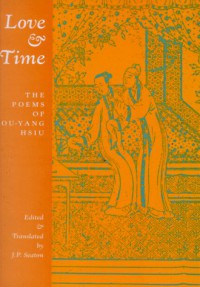Currently reading
Love and Time , Poems by Ou-Yang Hsiu

Ou-yang Hsiu (Ouyang Xiu ; 1007-1072) was born on the Western frontier of Sung (Song) dynasty China, and though his father died when Ou-yang was only 3 or 4, because the rise of printing in the early Sung made the Confucian classics available at a price affordable even to persons in straightened circumstances, he was able to prepare for the Imperial Civil Service Examination, largely on his own, and attained the highest degree at the age of 22. Ou-yang had a long and eventful political career, but here I am interested in him as one of the most highly regarded and influential poets of the Sung dynasty.
I have written in other reviews about the obstacles and challenges of translating classic Chinese poetry into modern English and why I continue to enjoy what is not a perfect, but, nonetheless, a real communication with those authors. The translator of the poems in this book, J.P. Seaton, has followed Ezra Pound's lead and has rendered these poems as modern American Imagist-influenced poems. They are lovely, and because these are the first poems by Ou-yang I've read, I am unable, as yet, to compare and contrast and try to find a common core. But these versions are more than enough to assure my interest in exploring Ou-yang's life and work in greater detail.
Seaton has translated little more than 50 poems here and has clearly made a selection to concentrate on a few themes and avoid recondite poems. One is Spring as a metaphor for youth and burgeoning life, the poet's anxious impatience for the Spring's arrival and his vain attempts to hold onto it. Another is love and love-making, approached obliquely and quietly. Indeed, these poems are almost uniformly quiet and calm, emotion recalled in tranquility...
An example:
Faint thunder drifts...
beneath the willow,
rain upon the pool.
The sound of rain,
and rain again from lotus leaves.
The western eaves of this small place
cut through the rainbow.
I leaned on the rail and waited
for the moon to bloom.
A swallow flew and perched
to peer in at the ridgepole.
The moon, jade hook,
hung from the curtain rod.
No waves on water,
still waves, the wrinkles of the coverlet.
Behind the crystal screen, two pillows:
on one, a hairpin fell.
Another:
Ruffed blue-green fields, red blossoms,
clear skies fill the eye.
Orioles drift above embroidered mats,
flit up and down together.
On purpled paths and dust gold wagon tracks,
my horse's hooves tread spring land's green.
A sudden spring dream
crowded with my years,
the past so far, so far.
Enough, a hundred kinds of pondering...
Though misting rain fills the tower,
the line of mountains stands unbroken.
Idly a man tries everywhere
to find a crook of rail to lean on.
 6
6












